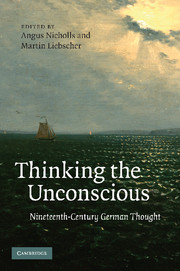Book contents
- Frontmatter
- Contents
- Notes on contributors
- Introduction: thinking the unconscious
- 1 The unconscious from the Storm and Stress to Weimar classicism: the dialectic of time and pleasure
- 2 The philosophical significance of Schelling's conception of the unconscious
- 3 The scientific unconscious: Goethe's post-Kantian epistemology
- 4 The hidden agent of the self: towards an aesthetic theory of the non-conscious in German romanticism
- 5 The real essence of human beings: Schopenhauer and the unconscious will
- 6 Carl Gustav Carus and the science of the unconscious
- 7 Eduard von Hartmann's Philosophy of the Unconscious
- 8 Gustav Theodor Fechner and the unconscious
- 9 Friedrich Nietzsche's perspectives on the unconscious
- 10 Freud and nineteenth-century philosophical sources on the unconscious
- Epilogue: the “optional” unconscious
- Works cited
- Index
6 - Carl Gustav Carus and the science of the unconscious
Published online by Cambridge University Press: 04 August 2010
- Frontmatter
- Contents
- Notes on contributors
- Introduction: thinking the unconscious
- 1 The unconscious from the Storm and Stress to Weimar classicism: the dialectic of time and pleasure
- 2 The philosophical significance of Schelling's conception of the unconscious
- 3 The scientific unconscious: Goethe's post-Kantian epistemology
- 4 The hidden agent of the self: towards an aesthetic theory of the non-conscious in German romanticism
- 5 The real essence of human beings: Schopenhauer and the unconscious will
- 6 Carl Gustav Carus and the science of the unconscious
- 7 Eduard von Hartmann's Philosophy of the Unconscious
- 8 Gustav Theodor Fechner and the unconscious
- 9 Friedrich Nietzsche's perspectives on the unconscious
- 10 Freud and nineteenth-century philosophical sources on the unconscious
- Epilogue: the “optional” unconscious
- Works cited
- Index
Summary
Carus' place in intellectual history
“The key to understanding the conscious life of the soul lies in the realm of the unconscious.” In its explicitness, straightforwardness, perhaps even bravery, this sentence demands our attention. It was published in 1846, the opening sentence of a book, Psyche: On the Developmental History of the Soul (Psyche: Zur Entwicklungsgeschichte der Seele), whose author, Carl Gustav Carus (1789–1869), has a strong claim to be considered the first proper theorist of the unconscious. Carus' achievement was to present an explicit and systematic theory of the unconscious and to make this theory the foundation and the centerpiece of his theory of mind. Earlier philosophers developed theories of the unconscious: Plato and Aristotle perhaps, certainly Plotinus (204/5–270 CE), and in the modern period Marsilio Ficino (1433–99), Ralph Cudworth (1617–88), Gottfried Wilhelm Leibniz (1646–1716), Christian Wolff (1679–1754), Friedrich Schelling (1775–1854), and Arthur Schopenhauer (1788–1860). Yet these theories were only ever adjuncts or by-products of more general theories of mind. No one before Carus makes the unconscious central to a theory of mind. Historically then, and as far as the range of this volume is concerned, with Carus we reach a tipping point. From this point onwards the unconscious becomes an unavoidable issue in German psychological theory.
Yet it is tempting to say that Carus is the forgotten man of the history of German psychological theory. Carus' psychology is seldom read today.
- Type
- Chapter
- Information
- Thinking the UnconsciousNineteenth-Century German Thought, pp. 156 - 172Publisher: Cambridge University PressPrint publication year: 2010
- 8
- Cited by

